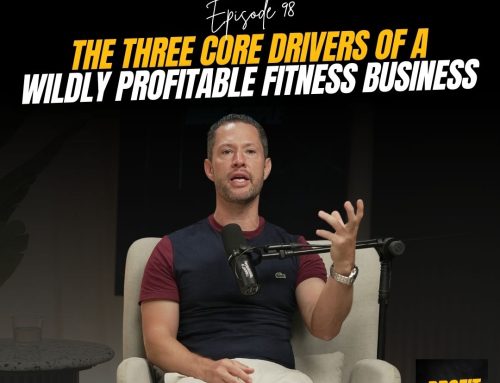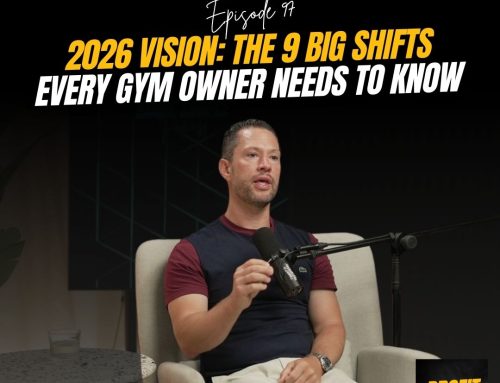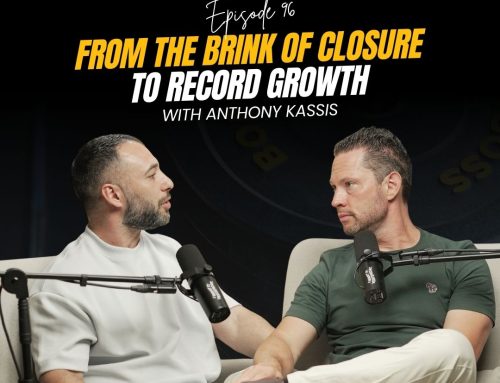Introduction: Discipline Isn’t Always the Answer
We often glorify discipline as the ultimate key to success. But for fitness business owners, the very trait that fuels early wins can quietly evolve into the greatest barrier to long-term growth.
In this special episode of Profit Made Simple, Daniel Woodrum—fitness entrepreneur and co-author of The Dark Side of Discipline—shares how over-reliance on hustle can imprison us. Instead, he offers a practical framework to build and live by powerful personal standards.
1. From Hustle to Imprisonment
Daniel’s story is one many fitness business owners will relate to. He opened his first gym in his early 20s with relentless work ethic—12 to 14-hour days, grinding nonstop. It worked.
His business grew fast. But as he scaled to multiple locations, he became trapped by his own unsustainable hustle. His discipline became his cage.
2. The Birth of the Book
Daniel reconnected with long-time friend and entrepreneur Craig Ballantyne, who had begun writing The Dark Side of Discipline but felt something was missing. After watching Daniel deliver a powerful presentation on personal standards at a mastermind, Craig knew he’d found the missing piece—and invited Daniel to co-author the book.
3. What Are Standards—and How Are They Different from Discipline?
Standards are not about willpower or good intentions. They are non-negotiable rules you write for your own life. Not someone else’s version of success. Yours. This is the antidote to robotic living and burnout: you define your code, and then you live by it.
4. The 3-Layer Framework for Personal Standards
Daniel developed a 3-layer system to help others replicate what worked for him:
- Step 1: Define 4 Phases of Life That Matter Most
- (e.g., Family, Health, Leadership, Discipline)
- Step 2: Write a Mission Statement for Each Phase
- Why does this area matter? What does success look like?
- Step 3: Create 3 Specific, Actionable Standards Per Phase
- That’s 12 total rules—your new operating system.
5. Real Example: Family Standards That Changed Everything
Daniel’s standards in the family category include:
- No work after 4 PM to prioritise quality time
- Say “I love you” daily to his wife and kids
- Operate as a team (#TeamWoodrum) to improve communication
These rules didn’t just improve his family life—they made him sharper in business by forcing focus and protecting energy.
6. Why Accountability Makes Standards Stick
Without accountability, standards are just good ideas. Daniel recommends building a “trust tribe”—2 to 5 people who you’d hate to disappoint. These aren’t casual friends. They’re committed partners in your growth. Weekly check-ins make all the difference.
7. Keep Your Standards Front and Centre
Daniel keeps his 12 standards as his phone wallpaper—a subtle but consistent visual reminder. You can also print them out and place them on your desk, bathroom mirror, or office wall.
8. Weekly Self-Audits to Stay Aligned
Rate yourself weekly on how well you lived by your standards. A 7 out of 10? Why? What slipped? What system or accountability was missing? Self-reflection keeps your standards evolving and relevant.
9. Don’t Go All-In Immediately—Start Small
Implementing 12 new rules overnight is a recipe for failure. Daniel recommends starting with just 1 per life phase—4 total standards. Once those become habits, you layer in the rest.
10. Don’t Copy—Create
Being inspired by others is great. But copying someone else’s standards leads you down their path—not yours. Make sure your rules resonate deeply with your values, needs, and vision.
11. Standards Should Evolve With You
Your standards at 25 will be different from your standards at 40. And that’s a good thing. Your rules should grow as you do.
12. Overwhelmed? Start With Your “Level 10 Problem”
Many gym owners are already juggling too much. If you’re exhausted, don’t start by adding more. Instead, identify the biggest problem in your business or life and throw everything you’ve got at solving it. Let your new standards emerge from there.
13. The Level 10 Principle
Craig and Daniel preach this: Put Level 10 effort into your Level 10 problem. Too often, entrepreneurs invest massive energy in Level 2 problems because they’re easier or less scary. Don’t mistake motion for progress.
14. The Transformation Is Both Personal and Professional
Daniel’s story proves that personal standards don’t just make you a better human—they make you a better leader. He’s a more present dad, a more intentional husband, and a sharper business owner because he decided to stop reacting and start designing.
15. Get the Framework and the Book
The system Daniel shared is fully detailed in The Dark Side of Discipline—available on Amazon. It’s not just a book; it’s a course. Templates, frameworks, and real-world examples included.
Conclusion: Lead With Standards, Not Stress
Discipline gets you started. But without clear standards, it can destroy you. As fitness business owners, we need more than hustle. We need alignment. Create your rules. Live by them. Revisit them. And watch how everything else starts falling into place.







Leave A Comment